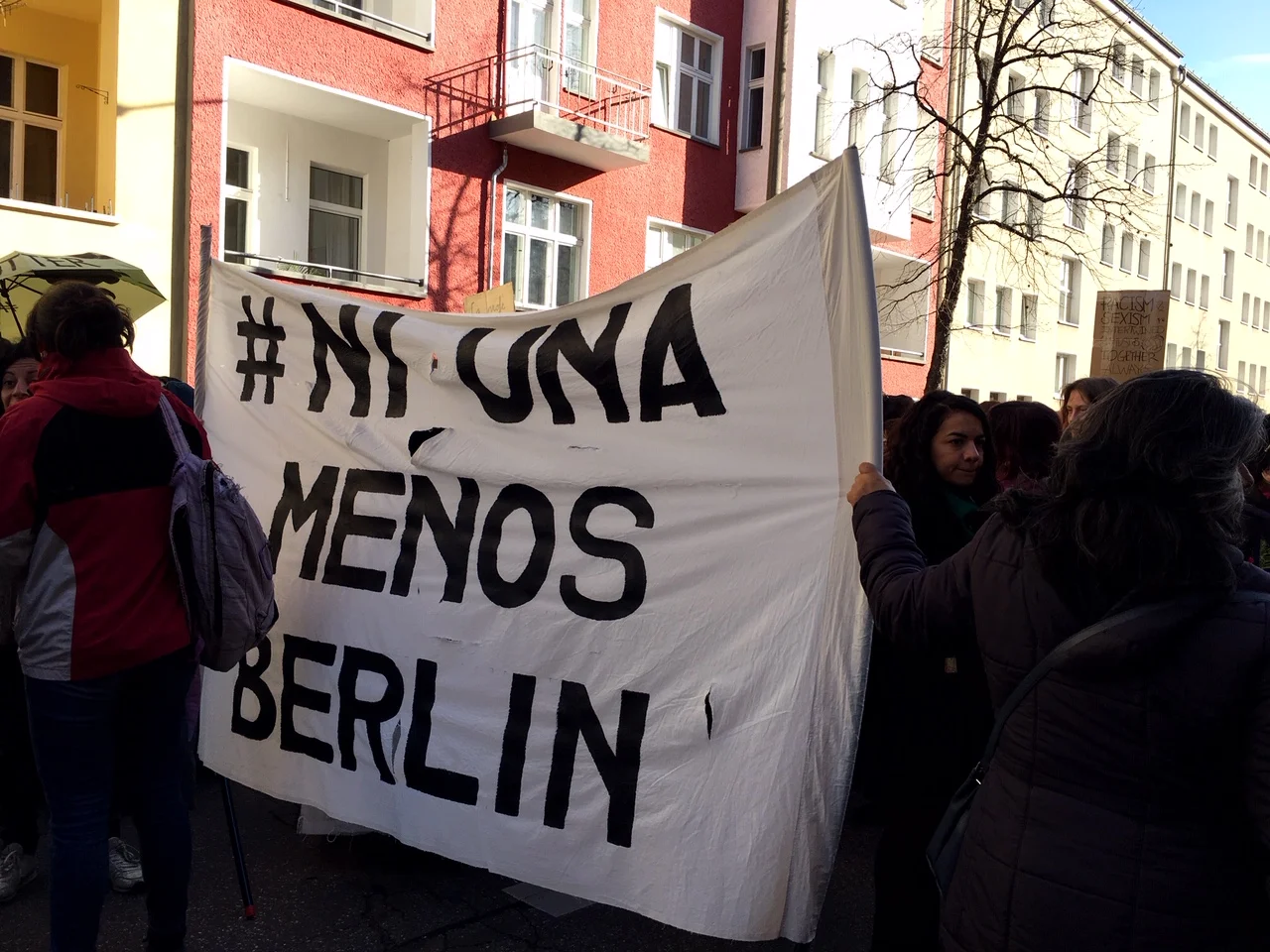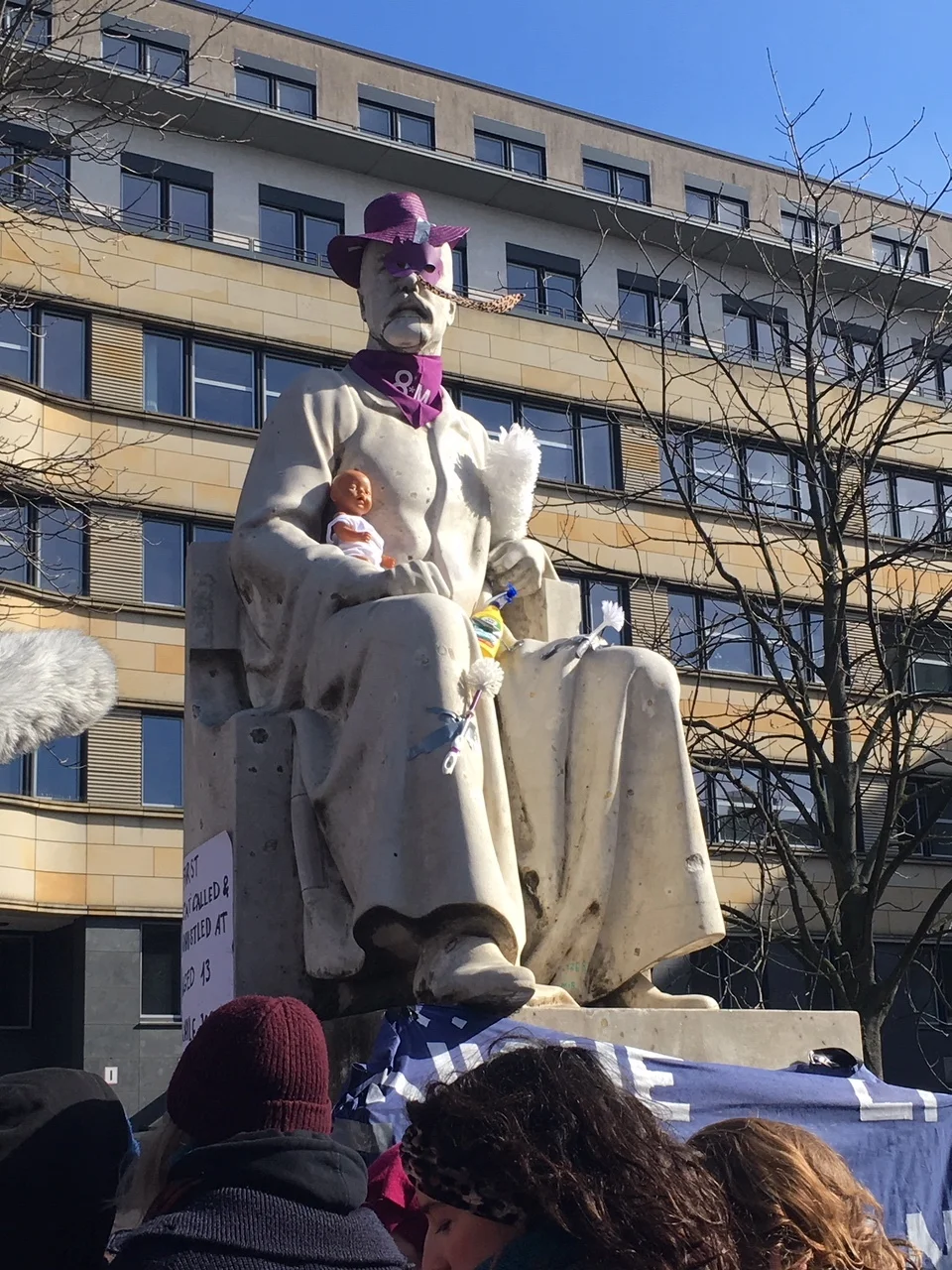Edna Bonhomme
Frauen* Streik in Germany
“All women, whatever be their position, should demand political equality as a means of a freer life, and one calculated to yield rich blessings to society.”
-Clara Zetkin
Over 100 years after German socialist Clar aZetkin proposed an International Woman’s Day (IWD) at the International Conference for Socialist Women, over 25,000 people demonstrated for Frauen* Streik in Berlin, Germany. Women at the turn of the nineteenth century and women living in the twenty-first century, organised themselves through various strike actions on the 8th of March for simple demands--to live in a world where they can be more free. This year marked the first time that March 8th was a public holiday in Berlin and the political acuity of the events reverberated from daybreak strike actions for health workers to nightfall solidarity parties throughout the city.
Thousands of transgender, intersex people, gender non-binary individuals, and womxn also marched throughout German cities such as Leipzig, Hamburg, and Göttingen. The wave of activities speaks volumes to the growing economic and social frustrations that women of various backgrounds have been facing in Germany and internationally. Protestors linked the day’s activities to their struggle for abortion rights, their opposition to gender based violence, and their conflicts at the workplace. When asked why she was participating in 8th of march demonstrations, Ruth a thirty-three year old hostel worker responded, “I think my boss is a sexist.” In Germany, political equality are driving forces and the increased participation of migrants and people of colour proclaiming, “no one is illegal” has also politicized the character and composition of IWD opening up room to challenging European and North American imperialism.
Leading up to 8th of March, feminists and queer activists throughout Germany formed a national network and two national conferences (in Göttingen and Berlin) planting the seeds for a new international feminist movement. These initiatives were part of an effort to deepen and integrate the autonomous leftist, pro-choice, and anti-racist networks into a growing feminist movement. The radical character of IWD was not unique to Germany but was part of a thriving international women’s strike movement in several dozen countries including Argentina, Chile, Ireland, Mexico, Spain, and the United States. Not only were people pointing to the productive capacities of womxn’s labour, IWD activists sought to make links to ongoing strike campaigns, environmental initiatives, and immigration issues in Germany.
The strike actions were preceded by a set of events earlier that week, mostly concerning fair wages and precarity in Germany. For one, women editors at neues Deutschland, a leftist German newspaper, went on strike on 7 March leaving blank columns to show the power of their labour. Moreover, this action not only highlighted the wage disparity between men and women in journalism, i.e., which is approximately 21%, but it also called for comprehensive transparency of salary for permanent and freelance journalists.
Abortion rights has also featured into pre-IWD actions with 200 pro-choice activists gathering outside the Ministry of Public Health to oppose Article 218 and article 219a on 7 March. These Nazi-holdover German decrees define abortion as murder and prohibit physicians from advertising abortions in Germany. The day before International women’s day 300 activities gathered outside of the Ministry of Public Health outside calling to end these oppressive policies. The basis of the resurgent movement weg 218/219a echos what women and queer people have been fighting for globally, to have control and autonomy over their bodies.
Strike actions were not merely symbolic but they were articulated by a number of workers who are embedded in current labour struggles in Germany. At 6am, Frauen* Strike activists showed their support for physical therapists who have been leading at 4 week strike at Charité, the largest public health institution in Berlin. As one health worker from that campaign indicated, “when women stop working, the world stands still.” Childcare workers who went on strike earlier in 2019 also gathered at noon for a 400 person strong sit-in at Robert Koch Platz in Berlin. Katrina, a thirty one year old kindergarten teacher spoke about their strike why how their were fighting for justice for “parents, students, and teachers.” The campaign continues because they have initiated a campaign for fair wages for cleaners at her workplace.
Moreover, an Internationalist Alliance contingent of mostly women, transgender, and intersex people gathered outside of Justizvollzugsanstalt für Frauen Berlin, the women’s prison in the the former East Berlin. This action was an effort to be in solidarity with incarcerated women, who were, in part, because of the imprisoned because of self-defense from gender based violence. The international block of protestors further articulated their rage with a Global Scream which captured the internalized frustration of the demonstrators but it also allowed the collective voice of women were made bare. Activists also made sure to honour the socialist-feminist foremothers who helped to shaped early twentieth century feminism. For example, members of the Die Linke (Left Party) placed a rose for Clara Zetkin.
The actions on 8 March gestured towards the feminist history and the feminist futures. Hundreds of teenagers who were part of Fridays for Future, a global student led initiative that wants to make governments accountable to the climate protection, as outlined by the 2015 Paris agreements. It is no accident that these climate justice teach-ins and strike actions are led by young women who see the fight for the environment as a feminist issue.
Solidarity was a central feature of the Berlin IWD action and the assortment of strategies expresses the vivacity of the new feminist movement in Germany. At the same time, the political test over the coming years is to broaden the demands so as to challenge Germany’s growing far right movement, the ongoing xenophobia in Europe, and to address the gendered aspect of the global economic crisis. As a new generation of feminists and queers are building a movement that speaks to the concerns of labour, migration, health, and incarceration this feminism will have to reckon with intersectional, unapologetic and nuanced initiatives that can reformulate a feminism for the 99%.
Note: Frauen*-the asterik is used to include women, transgender people, intersex people, and gender non-conforming people


